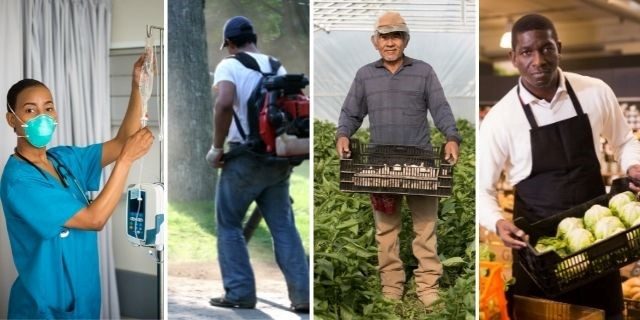05
Sep
Commentary: This Labor Day, Let’s Build Coalitions for a Healthful Social Structure that Protects Workers and the Public

(Beyond Pesticides, September 6, 2021) This Labor Day, as we live through our second year of the coronavirus pandemic, it is especially appropriate that we continue to express gratitude to all essential workers—healthcare workers, farmworkers, food processors, grocery workers, and others that put their lives on the line every day. But our gratitude does not protect anyone’s health. Nobody should have to risk their health for a job. That’s why, on this Labor Day, we must renew our commitment to eliminate the racial and economic inequities in our society that contribute to disproportionate risk to the health and well-being of workers, especially people of color. We can do this through the adoption of local, state, and national policies that eliminate toxic pesticide use, which disproportionately affects workers.
As we as a nation recognize that systemic change is needed to fight racial and economic injustice, we are faced with questions that go to the core of our society—the distribution of wealth, a livable wage, investment in and access to education and health care, protection of the right to vote, and an environment that sustains life.
This is a moment for building coalitions in our communities to advance policies that ensure all aspects of a healthful life and environment, supported by our social structures. In doing this, we recognize that we must join together to build the necessary power to effect meaningful and transformational change that confronts the existential public health (including worker health), climate, and ecological crises.
Our work to advance systemic change will continue to seek changes in underlying policies that codify disproportionate harm, such as federal pesticide law that is built on a foundation that allows elevated and disproportionate risk to workers who are excluded from EPA’s cumulative risk assessment (under the Food Quality Protection Act, amendments to the Federal Food, Drug and Cosmetic Act and the Federal Insecticide, Fungicide, and Rodenticide Act), which aggregates dietary and non-dietary, but explicitly not occupational, exposure to pesticides, while including a mandate to protect children. With this, the law effectively requires EPA to allow higher rates of harm for workers, particularly farmworkers, landscapers (workers who are disproportionately people of color), and others occupationally exposed to pesticides.
EPA’s recent decision to ban food uses of chlorpyrifos, but still allow it to be applied on golf courses, road medians, processed wood products, and more, is just one more glaring example of EPA’s failure to protect workers who handle toxic pesticides, and the general population and planet.
Change starts in our communities. The coronavirus pandemic has increased our understanding of disproportionate harm from Covid, with the recognition of elevated illness and death among essential Black and brown workers in our community. We have learned that those with preexisting adverse health conditions (or comorbidities) are at elevated risk. As we rethink our approach to pesticide reform, we ask: Does a science-based, public health-oriented, occupational safety focused, children-concerned, ecologically protective society allow the use of toxic pesticides that are unnecessary to achieve land management, quality of life, and food productivity goals? The answer, of course, is “no.”
Now is the time to eliminate worker and community hazards with the adoption of organic land management practices and policies in all our communities. We can eliminate petroleum-based toxic pesticides and fertilizers, protecting workers, and achieve beautiful landscapes and safe playing fields and parks. With increased momentum nationwide, in all parts of the country, all communities can make the transition, as we work with states and the federal government to eliminate our unnecessary dependence on toxic pesticides.
In our communities, let’s protect the workers, public health, and the environment. To discuss transitioning your community to organic land management, contact [email protected].
—Jay Feldman, executive director of Beyond Pesticides.











I am currently working on finishing freehand plans/inventing the best possible food grade metal Vermicomposting containers for commercial use, in Nurseries & such Ag. industries.
The only problem I been having is trying to find a metal worker(s), even their union or even better metal working business that will agree to build them for me.
September 8th, 2021 at 2:45 pm